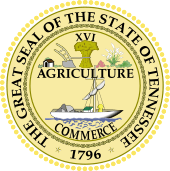Tennessee Senate
The Tennessee Senate is the upper house of the U.S. state of Tennessee's state legislature, which is known formally as the Tennessee General Assembly.
Senate of Tennessee | |
|---|---|
| Tennessee General Assembly | |
 | |
| Type | |
| Type | |
Term limits | None |
| History | |
New session started | January 8, 2019 |
| Leadership | |
Speaker of the Senate | |
Speaker pro tempore | |
Majority Leader | |
Minority Leader | |
| Structure | |
| Seats | 33 |
 | |
Political groups | Majority party
Minority party
|
Length of term | 4 years |
| Authority | Article III, Tennessee Constitution |
| Salary | $19,009/year + per diem |
| Elections | |
Last election | November 6, 2018 (17 seats) |
Next election | November 2, 2020 (16 seats) |
| Redistricting | Legislative Control |
| Meeting place | |
 | |
| State Senate Chamber Tennessee State Capitol Nashville, Tennessee | |
| Website | |
| www | |
The Tennessee Senate has the power to pass resolutions concerning essentially any issue regarding the state, country, or world. The Senate also has the power to create and enforce its own rules and qualifications for its members. The Senate shares these powers with the Tennessee House of Representatives. The Senate alone has the power to host impeachment proceeding and remove impeached members of office with a 2/3 majority. The Tennessee Senate, according to the state constitution of 1870, is composed of 33 members, one-third the size of the Tennessee House of Representatives. Senators are to be elected from districts of substantially equal population. According to the constitution, a county is not to be joined to a portion of another county for purposes of creating a district; this provision has been overridden by the rulings of the Supreme Court of the United States in Baker v. Carr (369 U.S. 182, 1962) and Reynolds v. Sims (337 U.S. 356, 1964). The Tennessee constitution has been amended to allow that if these rulings are ever changed or reversed, a referendum may be held to allow the senate districts to be drawn on a basis other than substantially equal population.
Until 1966, Tennessee state senators served two-year terms. That year the system was changed, by constitutional amendment, to allow four-year terms. In that year, senators in even-numbered districts were elected to two-year terms and those in odd-numbered districts were elected to four-year terms. This created a staggered system in which only half of the senate is up for election at any one time. Senators from even-numbered districts are elected in the same years as presidential elections, and senators from odd-numbered districts are elected in the same years as mid-term elections. Districts are to be sequentially and consecutively numbered; the scheme basically runs from east to west and north to south.
Republicans attained an elected majority in the Senate in the 104th General Assembly (2005–07) for the first time since Reconstruction; a brief majority in the 1990s was the result of two outgoing senators switching parties.
Senate Speaker
According to Article III, Section 12 of the Constitution of the State of Tennessee, the Speaker of the Senate assumes Office of Governor in the event of a Vacancy. The Senate elects one of its own members as Speakerand the Speaker automatically becomes Lieutenant Governor of Tennessee. The Speaker appoints a Speaker Pro Tempore who presides over the Senate in the absence of the Speaker as well as a Deputy speaker to assist the Speaker in his or her duties. The current Speaker of the Senate and Lieutenant Governor is Randy McNally, who was elected to the position in 2017. One of the main duties of the Speaker is to preside over the Senate and make Senate committee appointments based upon ability and preference of members, seniority, and party representation. The Speaker also maintains the power to remove members from Committee appointments. The Speaker, in cohort with the Speaker of the House of Representatives, chairs the Joint Legislative Services Committee which provides assistance to the General Assembly. The Speaker also controls staffing and office space with Senate staff. The Speaker serves as an ex-officio member of all standing committees.[1]
Oath and qualifications of office
Oath of office
“I [name of official] do solemnly swear that, as a member of this, the [number, ex. One Hundred Eleventh] General Assembly of the State of Tennessee, I will faithfully support the Constitution of this State and of the United States, and I do solemnly affirm that as a member of this General Assembly, I will, in all appointments, vote without favor, affection, partiality, or prejudice; and that I will not propose or assent to any bill, vote or resolution, which shall appear to me injurious to the people, or consent to any act or thing, whatever, that shall have a tendency to lessen or abridge their rights and privileges, as declared by the Constitution of this state.”[1]
Qualifications for office
“No person shall be a senator unless he shall be a citizen of the United States, of the age of thirty years, and shall have resided three years in this state, and one year in the county or district, immediately preceding the election.”[1]
Composition of the 111th General Assembly (2019–21)
| Affiliation | Party (Shading indicates majority caucus) |
Total | ||||
|---|---|---|---|---|---|---|
| Republican | Independent | Democratic | Vacant | |||
| End of previous legislature | 26 | 0 | 4 | 33 | 3 | |
| Begin | 26 | 0 | 5 | 33 | 2 | |
| January 18, 2019[2] | 1 | 1 | ||||
| March 13, 2019[3] | 27 | 0 | ||||
| April 23, 2019[4] | 28 | 0 | 5 | 33 | 0 | |
| Latest voting share | 84.85% | 15.15% | ||||
Senate Leadership and Members
Senate Leaders
- Speaker of the Senate, Lieutenant Governor: Randy McNally
- Speaker pro tempore: Ferrell Haile
- Deputy Speaker: Janice Bowling
| Majority Party (R) | Leadership Position | Minority Party (D) |
|---|---|---|
| Jack Johnson | Leader | Jeff Yarbro[5] |
| Ken Yager | Caucus Chairperson | Raumesh Akbari |
Members
| District | Name | Party | Residence | Counties represented |
|---|---|---|---|---|
| 1 | Steve Southerland | Rep | Morristown | Cocke, Greene, Hamblen, and part of Sevier |
| 2 | Art Swann | Rep | Alcoa | Blount and part of Sevier |
| 3 | Rusty Crowe | Rep | Johnson City | Washington, Unicoi, and part of Carter |
| 4 | Jon Lundberg | Rep | Bristol | Johnson, Sullivan, and part of Carter |
| 5 | Randy McNally | Rep | Maryville | Anderson, Loudon, and part of Knox |
| 6 | Becky Duncan Massey | Rep | Knoxville | Part of Knox |
| 7 | Richard Briggs | Rep | Knoxville | Part of Knox |
| 8 | Frank S. Niceley | Rep | Strawberry Plains | Claiborne, Grainger, Hancock, Hawkins, Union, and Jefferson |
| 9 | Mike Bell | Rep | Riceville | Polk, McMinn, Meigs, Monroe, and part of Bradley |
| 10 | Todd Gardenhire | Rep | Chattanooga | Parts of Hamilton and Bradley |
| 11 | Bo Watson | Rep | Hixson | Part of Hamilton |
| 12 | Ken Yager | Rep | Kingston | Campbell, Fentress, Morgan, Rhea, Roane, Pickett, and Scott |
| 13 | Dawn White | Rep | Murfreesboro | Part of Rutherford |
| 14 | Shane Reeves | Rep | Murfreesboro | Bedford, Lincoln, Marshall, Moore, and part of Rutherford |
| 15 | Paul Bailey | Rep | Sparta | Cumberland, Jackson, Overton, Bledsoe, Putnam, and White |
| 16 | Janice Bowling | Rep | Tullahoma | Coffee, Franklin, Grundy, Marion, Van Buren, and Warren |
| 17 | Mark Pody | Rep | Lebanon | Cannon, Clay, DeKalb, Macon, Smith, and Wilson |
| 18 | Ferrell Haile | Rep | Gallatin | Sumner, Trousdale, and part of Davidson |
| 19 | Brenda Gilmore | Dem | Goodlettsville | Part of Davidson |
| 20 | Steven Dickerson | Rep | Nashville | Part of Davidson |
| 21 | Jeff Yarbro | Dem | Nashville | Part of Davidson |
| 22 | Bill Powers | Rep | Clarksville | Stewart, Houston, and Montgomery |
| 23 | Jack Johnson | Rep | Franklin | Williamson |
| 24 | John Stevens | Rep | Huntingdon | Benton, Carroll, Gibson, Henry, Obion, and Weakley |
| 25 | Kerry Roberts | Rep | Springfield | Cheatham, Dickson, Hickman, Humphreys, and Robertson |
| 26 | Dolores Gresham | Rep | Somerville | Chester, Decatur, Fayette, Hardeman, Hardin, Haywood, McNairy, and Henderson |
| 27 | Ed Jackson | Rep | Jackson | Madison, Crockett, Dyer, Lake, and Lauderdale |
| 28 | Joey Hensley | Rep | Hohenwald | Giles, Lawrence, Lewis, Maury, Perry, and Wayne |
| 29 | Raumesh Akbari | Dem | Memphis | Part of Shelby |
| 30 | Sara Kyle | Dem | Memphis | Part of Shelby |
| 31 | Brian Kelsey | Rep | Collierville | Part of Shelby |
| 32 | Paul Rose | Rep | Covington | Tipton and part of Shelby |
| 33 | Katrina Robinson | Dem | Memphis | Part of Shelby |
Senate Committees
The Tennessee State Senate has 12 committees in total: 9 standing Committees and 3 Select Committees. During the 111th General Assembly, they are:[6]
| Committee Name | Chair |
|---|---|
| Commerce and Labor | Paul Bailey (R) |
| Education | Dolores Gresham (R) |
| Energy, Agriculture, and Natural Resources | Steve Southerland (R) |
| Finance, Ways, and Means | Bo Watson (R) |
| Government Operations | Kerry Roberts (R) |
| Health and Welfare | Rusty Crowe (R) |
| Judiciary | Mike Bell (R) |
| State and Local Government | Steve Dickerson (R) |
| Transportation and Safety | Becky Duncan Massey (R) |
| Committee Name | Chair |
|---|---|
| Calendar | Ed Jackson (R) |
| Ethics | Richard Briggs (R) |
| Rules | Bo Watson (R) |
Past composition of the Senate
In 1921, Anna Lee Keys Worley became the first woman to serve in the Tennessee Senate.[7]
References
- Tennessee Blue Book.
- "Newly-appointed Senator Rosalind Kurita accepts invitation to caucus with Republicans in Tennessee Senate". Tennessee Senate Republican Caucus. January 15, 2019. Retrieved January 17, 2019.
- "NRepublican Paul Rose wins Senate District 32 race in special general election". Memphis Commercial Appeal. March 12, 2019. Retrieved March 14, 2019.
- "Tennessee Election Results". www.elections.tn.gov. Retrieved April 24, 2019.
- "Tennessee's Senate Democrats elect Nashville's Jeff Yarbro as minority leader". The Tennessean. Retrieved January 30, 2019.
- "Legislative Senate Committees - Tennessee General Assembly". www.capitol.tn.gov. Retrieved January 15, 2019.
- "Anna Lee Keys Worley". National Women's History Museum. Retrieved August 5, 2018.